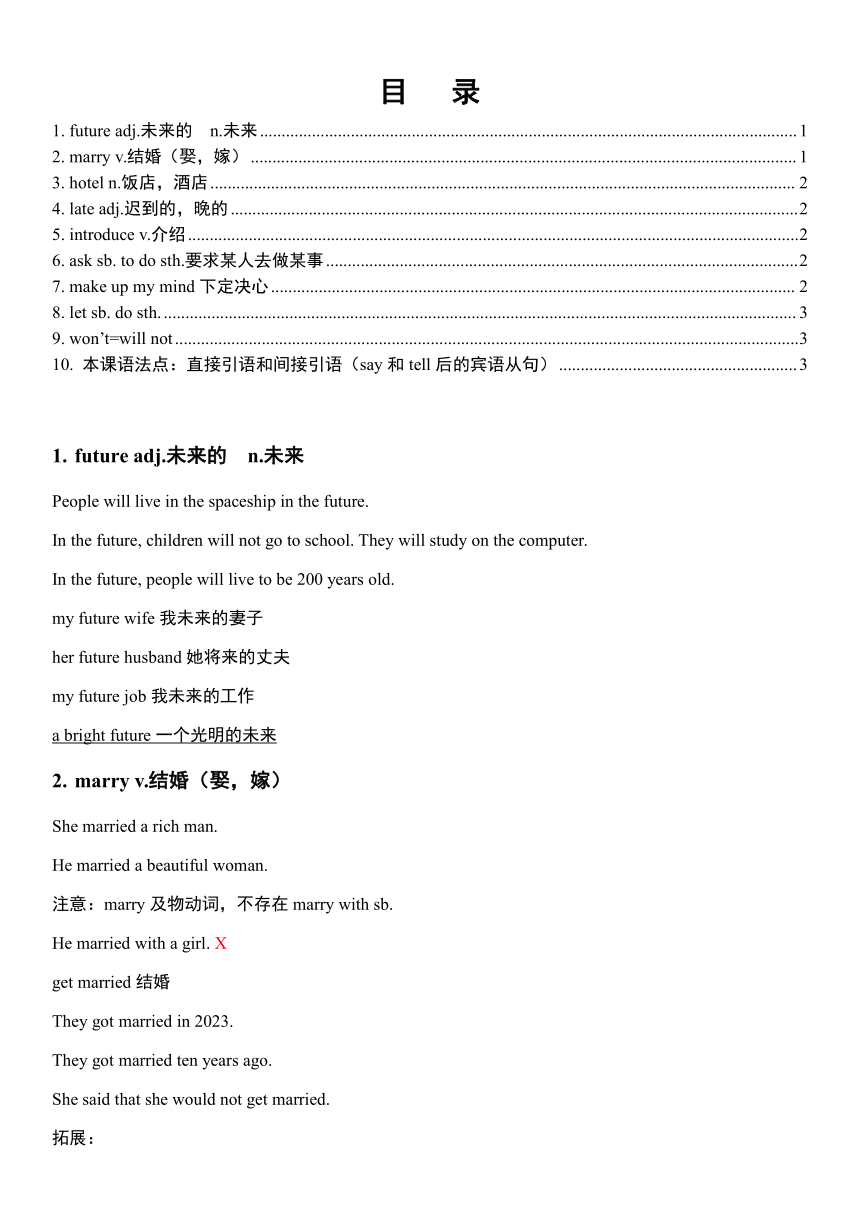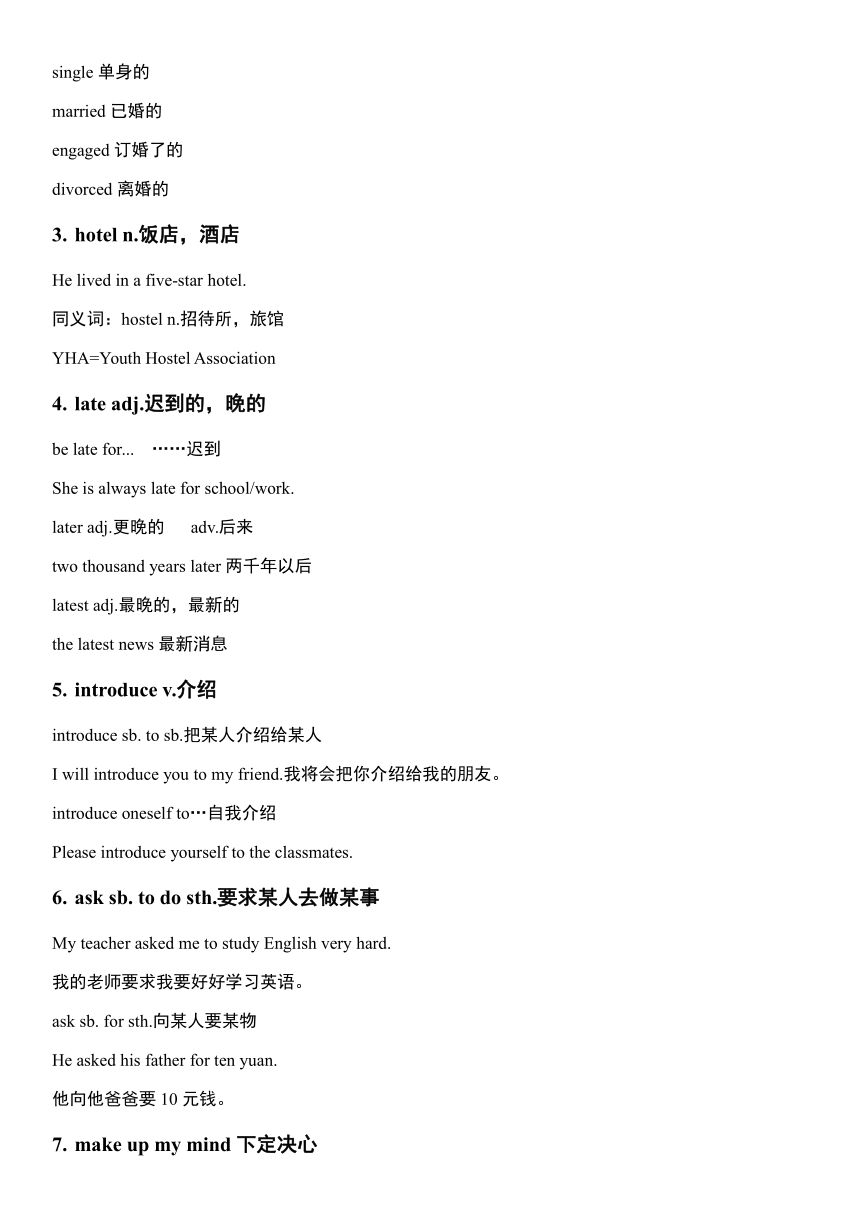新概念英语第一册Lesson135-136重点语法点
文档属性
| 名称 | 新概念英语第一册Lesson135-136重点语法点 |  | |
| 格式 | docx | ||
| 文件大小 | 140.2KB | ||
| 资源类型 | 教案 | ||
| 版本资源 | 新概念英语 | ||
| 科目 | 英语 | ||
| 更新时间 | 2024-05-21 19:40:01 | ||
图片预览


文档简介
目 录
1. future adj.未来的 n.未来 1
2. marry v.结婚(娶,嫁) 1
3. hotel n.饭店,酒店 2
4. late adj.迟到的,晚的 2
5. introduce v.介绍 2
6. ask sb. to do sth.要求某人去做某事 3
7. make up my mind下定决心 3
8. let sb. do sth. 3
9. won’t=will not 3
10. 本课语法点:直接引语和间接引语(say和tell后的宾语从句) 3
future adj.未来的 n.未来
People will live in the spaceship in the future.
In the future, children will not go to school. They will study on the computer.
In the future, people will live to be 200 years old.
my future wife我未来的妻子
her future husband她将来的丈夫
my future job我未来的工作
a bright future一个光明的未来
marry v.结婚(娶,嫁)
She married a rich man.
He married a beautiful woman.
注意:marry及物动词,不存在marry with sb.
He married with a girl. X
get married结婚
They got married in 2023.
They got married ten years ago.
She said that she would not get married.
拓展:
single单身的
married已婚的
engaged订婚了的
divorced离婚的
hotel n.饭店,酒店
He lived in a five-star hotel.
同义词:hostel n.招待所,旅馆
YHA=Youth Hostel Association
late adj.迟到的,晚的
be late for... ……迟到
She is always late for school/work.
later adj.更晚的 adv.后来
two thousand years later两千年以后
latest adj.最晚的,最新的
the latest news最新消息
introduce v.介绍
introduce sb. to sb.把某人介绍给某人
I will introduce you to my friend.我将会把你介绍给我的朋友。
introduce oneself to…自我介绍
Please introduce yourself to the classmates.
ask sb. to do sth.要求某人去做某事
My teacher asked me to study English very hard.
我的老师要求我要好好学习英语。
ask sb. for sth.向某人要某物
He asked his father for ten yuan.
他向他爸爸要10元钱。
make up my mind下定决心
make up one’s mind to do sth.下定决心做某事
I made up my mind to study English harder.
will have to将不得不,将必须
let sb. do sth.
let me make another film
let使役动词,意为:使;让
let sb. do sth.让某人做某事
Let’s go.=Let us go.让我们走吧。
won’t=will not
certainly adv.当然地,一定的
certainly=of course
本课语法点:直接引语和间接引语(say和tell后的宾语从句)
一、定义
直接引用别人的话叫直接引语。用自己的话转述别人的话叫间接引语。
一般来说,直接引语放在引号内;间接引语不用引号,用宾语从句来表达。
二、直接引语与间接引语的转换
(一)人称变化
直接引语中的代词变为间接引语时,要根据句意情景进行变化。
1.直接引语中的第一人称一般转换为第三人称或第一人称。
He said,"I'm hungry."
He said that he was hungry.
I said," I won't go home."
I said that I won't go home.
I told Lily," We will donate money to you."
I told Lily that we would donate money to her.
2.直接引语中的第二人称一般转换为第三人称或第一人称,直接引语中的第三人称仍保持不变。
Mom said to me:"You can clean your bedroom tomorrow."
Mom told me that I could clean my bedroom the next day.
Tina told her parents,"Tom is a nice boy.He is always ready to help."
Tina told her parents that Tom was a nice boy and that he was always ready to help.
(二)时态变化
当主句为一般现在时或一般将来时的时候,间接引语时态不变。
He says:"I gave you a pencil yesterday."
He says that he gave me a pencil yesterday.
如果主句为过去的某种时态,则间接引语的时态应相应向前推一个时态。
直接引语–间接引语
一般现在时–一般过去时
现在进行时–过去进行时
现在完成时–过去完成时
一般将来时–过去将来时
一般过去时–过去完成时
过去完成时–不变
过去进行时–不变
Tom said," I usually go to school at seven."
Tom said he usually went to school at seven.(一般现在时变为一般过去时)
(三)指示代词的变化
直接引语–间接引语
this-that
these-those
Tina said to me,"This is the library."
Tina said to me that was the library.
(四)时间状语的变化
直接引语-间接引语
now–then
today–that day
this evening– that evening
yesterday–the day before
yesterday morning–the day before
last night–the night before
two days ago–two days before
next week–the next week/the following week
tomorrow–the next day/the following day
the day before yesterday–two days before
the day after tomorrow–in two days' time/two days after
She said," I went there yesterday."
She said that she had gone there the day before.
(五)地点状语的变化
直接引语-间接引语
here–there
over here–over there
He said," This is the first time I've been here."
He said that was the first time he had been there.
(六)方向性动词的变化
直接引语-间接引语
bring–take
come–go
He asked me,"Could you bring the chairs upstairs "
He asked me if I could take the chairs upstairs.
1. future adj.未来的 n.未来 1
2. marry v.结婚(娶,嫁) 1
3. hotel n.饭店,酒店 2
4. late adj.迟到的,晚的 2
5. introduce v.介绍 2
6. ask sb. to do sth.要求某人去做某事 3
7. make up my mind下定决心 3
8. let sb. do sth. 3
9. won’t=will not 3
10. 本课语法点:直接引语和间接引语(say和tell后的宾语从句) 3
future adj.未来的 n.未来
People will live in the spaceship in the future.
In the future, children will not go to school. They will study on the computer.
In the future, people will live to be 200 years old.
my future wife我未来的妻子
her future husband她将来的丈夫
my future job我未来的工作
a bright future一个光明的未来
marry v.结婚(娶,嫁)
She married a rich man.
He married a beautiful woman.
注意:marry及物动词,不存在marry with sb.
He married with a girl. X
get married结婚
They got married in 2023.
They got married ten years ago.
She said that she would not get married.
拓展:
single单身的
married已婚的
engaged订婚了的
divorced离婚的
hotel n.饭店,酒店
He lived in a five-star hotel.
同义词:hostel n.招待所,旅馆
YHA=Youth Hostel Association
late adj.迟到的,晚的
be late for... ……迟到
She is always late for school/work.
later adj.更晚的 adv.后来
two thousand years later两千年以后
latest adj.最晚的,最新的
the latest news最新消息
introduce v.介绍
introduce sb. to sb.把某人介绍给某人
I will introduce you to my friend.我将会把你介绍给我的朋友。
introduce oneself to…自我介绍
Please introduce yourself to the classmates.
ask sb. to do sth.要求某人去做某事
My teacher asked me to study English very hard.
我的老师要求我要好好学习英语。
ask sb. for sth.向某人要某物
He asked his father for ten yuan.
他向他爸爸要10元钱。
make up my mind下定决心
make up one’s mind to do sth.下定决心做某事
I made up my mind to study English harder.
will have to将不得不,将必须
let sb. do sth.
let me make another film
let使役动词,意为:使;让
let sb. do sth.让某人做某事
Let’s go.=Let us go.让我们走吧。
won’t=will not
certainly adv.当然地,一定的
certainly=of course
本课语法点:直接引语和间接引语(say和tell后的宾语从句)
一、定义
直接引用别人的话叫直接引语。用自己的话转述别人的话叫间接引语。
一般来说,直接引语放在引号内;间接引语不用引号,用宾语从句来表达。
二、直接引语与间接引语的转换
(一)人称变化
直接引语中的代词变为间接引语时,要根据句意情景进行变化。
1.直接引语中的第一人称一般转换为第三人称或第一人称。
He said,"I'm hungry."
He said that he was hungry.
I said," I won't go home."
I said that I won't go home.
I told Lily," We will donate money to you."
I told Lily that we would donate money to her.
2.直接引语中的第二人称一般转换为第三人称或第一人称,直接引语中的第三人称仍保持不变。
Mom said to me:"You can clean your bedroom tomorrow."
Mom told me that I could clean my bedroom the next day.
Tina told her parents,"Tom is a nice boy.He is always ready to help."
Tina told her parents that Tom was a nice boy and that he was always ready to help.
(二)时态变化
当主句为一般现在时或一般将来时的时候,间接引语时态不变。
He says:"I gave you a pencil yesterday."
He says that he gave me a pencil yesterday.
如果主句为过去的某种时态,则间接引语的时态应相应向前推一个时态。
直接引语–间接引语
一般现在时–一般过去时
现在进行时–过去进行时
现在完成时–过去完成时
一般将来时–过去将来时
一般过去时–过去完成时
过去完成时–不变
过去进行时–不变
Tom said," I usually go to school at seven."
Tom said he usually went to school at seven.(一般现在时变为一般过去时)
(三)指示代词的变化
直接引语–间接引语
this-that
these-those
Tina said to me,"This is the library."
Tina said to me that was the library.
(四)时间状语的变化
直接引语-间接引语
now–then
today–that day
this evening– that evening
yesterday–the day before
yesterday morning–the day before
last night–the night before
two days ago–two days before
next week–the next week/the following week
tomorrow–the next day/the following day
the day before yesterday–two days before
the day after tomorrow–in two days' time/two days after
She said," I went there yesterday."
She said that she had gone there the day before.
(五)地点状语的变化
直接引语-间接引语
here–there
over here–over there
He said," This is the first time I've been here."
He said that was the first time he had been there.
(六)方向性动词的变化
直接引语-间接引语
bring–take
come–go
He asked me,"Could you bring the chairs upstairs "
He asked me if I could take the chairs upstairs.
同课章节目录
